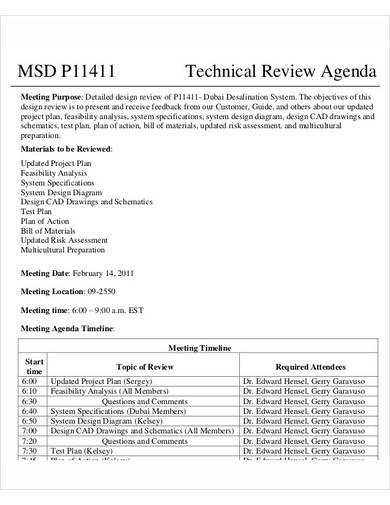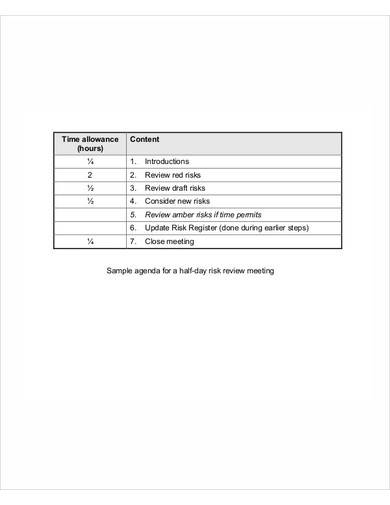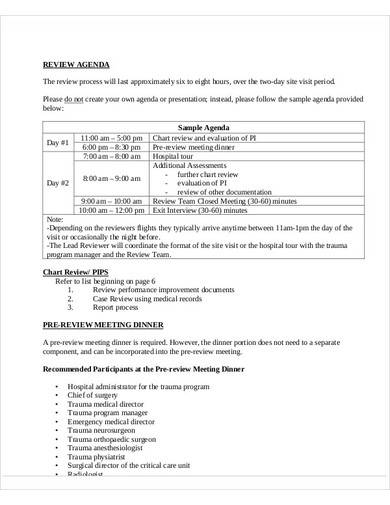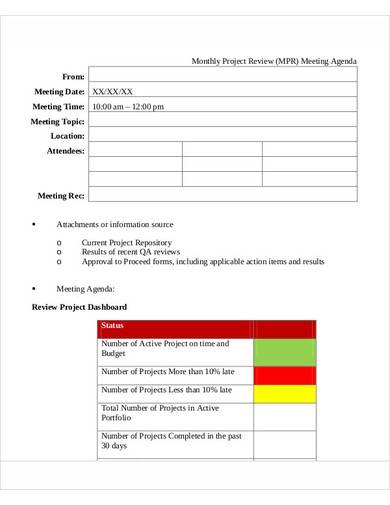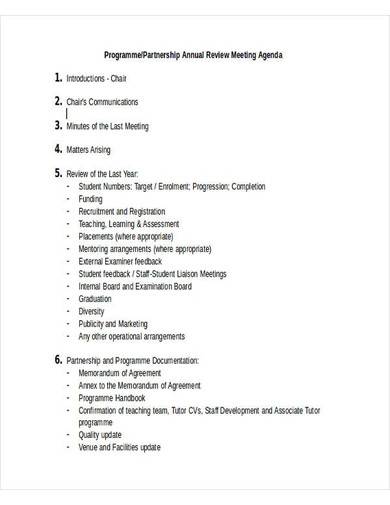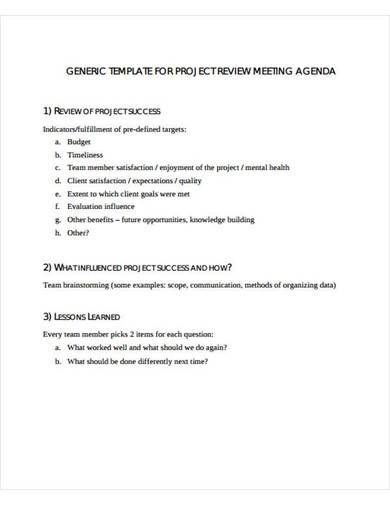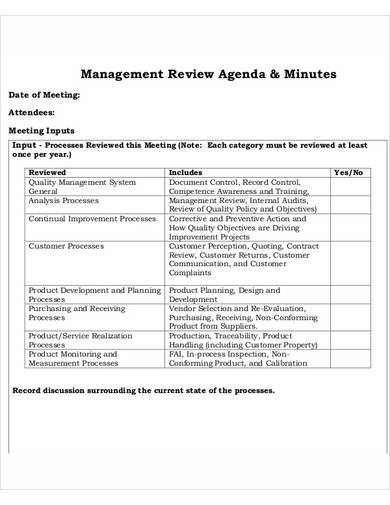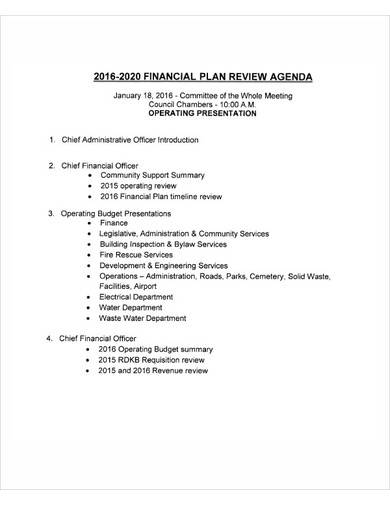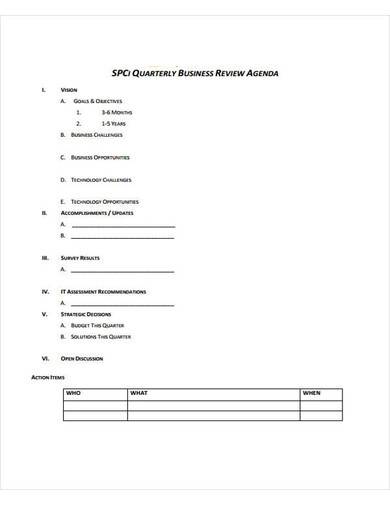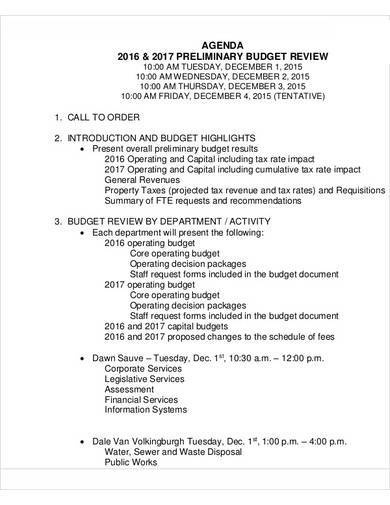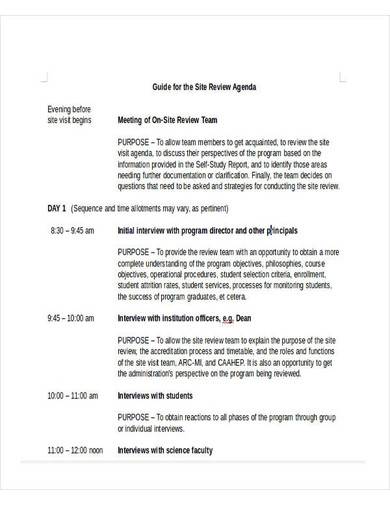It’s necessary to take a look at different matters for a second look or to check on materials again to serif you’ve missed a detail. It also gives you a status update and information that you can use to better your current circumstances. When you do, you want to make sure that everyone concerned with the issue at hand gets involved in important decision-making processes and bringing in ideas for the solution. A review agenda is useful in organizing meetings geared towards these purposes. It provides comprehensive details on what to present during the gathering. Learn more about this below.
FREE 10+ Review Agenda Samples
1. Sample Technical Review Agenda
2. Sample Meeting Agenda Review
3. Sample Review Agenda Template
4. Monthly Project Review Meeting Agenda
5. Annual Review Meeting Agenda
6. Sample Project Review Meeting Agenda
7. Management Review Agenda Template
8. Financial Plan Review Agenda
9. Sample Business Review Agenda
10. Agenda Preliminary Budget Review
11. Site Review Agenda Template
What Is a Review Agenda?
A review agenda is a type of meeting agenda that includes a list of activities and topics that pertains to a review or of materials and important matters. It can be any review topics such as revisiting the discussions from a previous gathering or taking a look at significant reports and presentations for scrutiny and evaluation. A review agenda provides a detailed outline of these concerns so the meeting can move at a directed and objective flow.
Importance of Having a Well-Organized Meeting Agenda
It’s no secret that not everyone loves meetings. In fact, 60% of US workers consider meetings as merely a distraction, and a third of them think meetings are useless. However, the World Economic Forum believes that despite the negative view of employees on meetings, they are still beneficial in a way that allows employees to connect with their colleagues that they don’t normally mingle with due to their task. It also allows them to understand how the management works and provides them with a platform to air their requests and grievances.
Meetings are nothing without a well-structured meeting agenda. Here are some reasons why your meeting agenda matters:
1. It clarifies objectives. Among the cause of unproductive meetings includes the session’s chair or committee only having an idea of what topic to discuss without a definite discussion flow. It causes a feeble topic structure, which can be easy to direct to other impertinent topics. A meeting agenda makes it easy for a presiding individual to direct the discussion to where the objective should be.
2. It’s a reliable time management tool. When you have a meeting agenda that emphasizes what the topics are and how the speaker should present it, the meeting becomes more focused. It eliminates irrelevant topics, which helps shorten the discussion time. It results in a productive meeting as it covers important topic territories.
3. It encourages member participation. In most cases, the committee announces the agenda ahead of the meeting schedule to help them know what to expect out of the discussion. When members are aware of the presentation’s gist, they’ll know how the presentation will look like. They will be more comfortable in actively taking part in the discussion instead of merely being a passive audience.
4. It allows participants to prepare for the meeting. Have you walked into a conference room with people who are as confused as you are? A detailed agenda on an email announcement or pinned on bulletin boards make it easy for those who are concerned with the topic to make the necessary preparation by reading the reports and making sure that they understand the information that the chair will show.
Tips on How to Make an Efficient Review Agenda
Making a review agenda might be easy. However, have you ever wondered how to make it work well? Below are some tips on the review agenda-making process that can help you make it useful and efficient in helping you achieve our goals:
1. Determine Your Agenda Topics
Your agenda topics will serve as your goal on what your review meeting should be all about. It will guide the officiating committee or whoever will lead the discussion of what the presentation’s content should have. For example, if your goal is to determine your financial performance during the last quarter, your agenda bullet should indicate a review of your previous financial statement during that period. If you want to recap the previous meeting’s discussions and check the progress of the tasks, you can emphasize this matter on the agenda list,
2. Provide a Time Estimate
Aside from providing the details of the meeting schedule, it’s also your job to determine the length of the meeting or the time it takes to address each agenda. Provide an ample period for the different parts of the discussion. You can allocate longer periods for important agenda items such as for casting votes and decision-making about certain options. However, you must remember that the meeting can’t take too long. Provide enough timeframe to cover each topic, but don’t let it take longer than it has to. Incite urgency and quick response with a definite time length.
3. Assign Roles
You will have to specify who will have to attend the meeting, so it’s clear for the entire organization if the meeting is for everyone or there are only certain teams involved. Besides citing the participants, it’s also important to clarify which individuals or roles will have significant participation during the discussion. Identify who will discuss and what their assigned topics are. It is an important detail so they’ll be reminded of their task, even when they’ve been told about it before receiving the team meeting agenda.
4. Avoid Making It Lengthy
The length of the agenda is almost always directly proportional to the length of the discussion. The more review items you involve, the more matters there will be during the meeting. It’s not ideal to address a myriad of topics on a single sitting because that would only result in an unproductive meeting. Keep it brief. If you have several topics to cover, opt to divide the meeting into two sessions. This way, you’ll be able to present a thorough report on your materials such as a project analysis or an action plan.
FAQs
What does “call to order” in a meeting means?
A “call to order” is a meeting command signalling they’re ready to deal with the agenda items.
What are the different classifications of meetings?
The different meeting classifications include problem-solving, status update, team building, innovation, information sharing, and decision-making meetings.
What are the necessary items on a meeting agenda?
The top necessary items in a meeting agenda are:
- Meeting objectives
- Meeting outline
- Attendance list
- Added action steps and details
- Meeting logistics
A review meeting or discussion allows you to revisit topics or dig deeper into important concerns that are necessary for obtaining your objective. It helps you gather the information that you’ve missed or haven’t thoroughly explored to get new insights and a fresh perspective. If you ever need a review agenda template, take one of ours. Download now!
Related Posts
FREE 7+ Research Agenda Samples in PDF
FREE How Meeting Agendas Result in Actionable Productivity ...
FREE 10+ Sample Meeting Agenda Templates in PDF MS Word
FREE 10+ Interview Agenda Samples and Templates in PDF MS ...
FREE 28+ Agenda Samples in MS Word
FREE 11+ Sample Meeting Summary Templates in PDF MS Word
FREE Dos and Don'ts of Meeting Agendas [ Steps in Conducting ...
FREE 6+ Sample Business Review in PDF MS Word
FREE 12+ Training Agenda Samples and Templates in PDF MS ...
FREE 10+ Sample Conference Schedules in PDF MS Word
FREE How to Effectively Facilitate a Meeting [ 10+ Samples ]
FREE 12+ Business Meeting Invitation Letter Templates in PDF MS ...
FREE 10+ Retail Notice Samples in PDF MS Word
FREE 6+ Student Agenda Samples in MS Word PDF
FREE 16+ Sample Meeting Minutes in MS Word PDF

